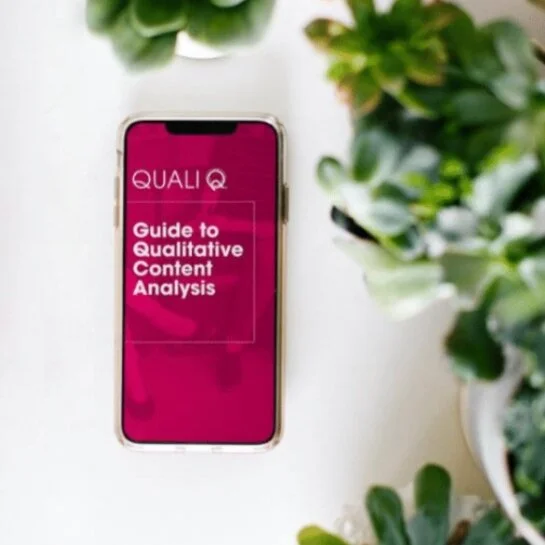Today’s blog post was written by a colleague, fellow dietitian, Quali Q contributor and passionate qualitative researcher, Tanya L’Heureux. Tanya has delved into embodiment throughout her PhD, and was able to share her wealth of knowledge with us. You’ll realize the complexity and nuance of this topic while appreciating her writing, including citations and references.
Read MoreSearch for a specific blog post here…
My qualitative learning started in 2009 as a Masters student, and at that point I did a lot of learning from textbooks and by doing. Over the years, I’ve come to realize that I enjoy learning from mentors, and have two people who are key in my qualitative research learning. Recognizing that I thrive as a mentee has been so helpful to me. It enabled me to prioritize my learning activities and where it’s worthwhile to spend my brain power and time. This was my inspiration to create the quiz “What Type of Qualitative Research Learner Are You?”.
Read MorePlain language is a topic that often comes up in my work in health research, and it always makes me feel guilty because it’s not my forte. I was born, raised, and married in Brazil, so Portuguese is my mother tongue. I know many rules you might never have heard of as a native English Speaker, but communicating in plain language requires an immense effort on my part. Thankfully, I can use two simple strategies to improve my communication skills/use of plain language as a qualitative researcher…
Read MoreI’m knee-deep in content creation for Qualitative Research Blueprint (QRB) –the next Quali Q online course –and recently started studying affective qualitative methodologies and embodiment theories. One of the bonuses for QRB will be led by Casey Berglund from Worthy & Well, an Embodiment Guide and Certified Professional Coach who will help QRB students learn to listen to their bodily sensations as they conduct qualitative research. This aligns well with affective qualitative methodologies. So what is affect?
Read MoreCross-lingual qualitative research is a topic that is near and dear to me because I wrote and published about it during my PhD. The paper was about conducting focus groups in languages that the researchers were not fluent in with the help of an interpreter or a moderator. Flash forward to my current work -> I’m planning to conduct interviews with French Canadian women -in French- as part of a consulting project. The three main considerations I’m transferring to my present work are the following…
Read MoreHave you visited the Services tab of the website to see all of the services that Quali Q offers? This week’s blog post was prompted by one of my current consulting projects; due to the nature of the study (and the reality of COVID-19), we will be doing our interviews online or over the phone. As a result, we will likely be using dyadic interviews for this project. What is a dyadic interview? Read on to find out…
Read MoreBecause of COVID-19, many qualitative researchers have had to move their data collection online. Today’s blog post is all about conducting online focus groups…
Read MoreWhat do kitchen renovations and semi-structured interview guides have in common? Overall, we start with a specific, tangible plan and end up doing way more than we envisioned at first. A parallel situation tends to happen with interview guides where we end up adding way too many questions just in case we forget something or need a bit more information here and there...
Read MoreLast week Quali Q launched an online mini course called Qualitative Data Analysis Masterclass, and it was a moment I dreamed of ever since I started thinking about Quali Q back in December 2018. This blog post is dedicated to qualitative research learning but today I will sharing with you a bit about my course creation journey. I know that there are many graduate students, trainees and practitioners in the Quali Q audience, and it feels important to me to discuss with you the career path I’m eagerly trying to carve out for myself through Quali Q.
Read MoreAs the title of the blog says, I almost named Quali Q “Sine Qua Non” and you might be reacting with a “What?” Well, the expression sine qua non comes from Latin and means an essential condition, without which it could not be. Even though qualitative data analysis isn’t the most essential piece when you are in the early stages of designing a qualitative research project, it’s important to choose an analytic approach that aligns with your overall methods and, most importantly, to strive for concurrent data collections and analysis…{read on for exciting news!}
Read MoreIn the last three posts, we talked about many aspects related to writing qualitative research proposals for funding opportunities. In this post, we are going to offer additional insights that can also be helpful to proposal reviewers. The points I’m raising here are based on Janice Morse’s article A Review Committee’s Guide for Evaluating Qualitative Proposals (Qualitative Health Research, Volume 13, Number 6, July 2003), which I highly recommend to qualitative proposal writers and reviewers alike…
Read MoreWe continue talking about writing qualitative research proposals, and hopefully setting you up for success with your own proposals. One of the areas you need to detail in a qualitative research proposal is methods. Writing your qualitative methods commonly feels like walking the line: you need to provide enough details yet demonstrate you’ll be flexible and responsive to your qualitative data…
Read MoreToday, we’re going to start talking about specifics of writing qualitative research proposals. It seems fitting to start with the literature review. Generally speaking, research proposals start with or include a short literature review that leads to the overall purpose of the study and/or research questions/objectives. I have a confession to make before you open this post: to me, writing an effective literature review has always been the most challenging and least pleasant.
Read MoreDespite the uncertainty researchers are currently dealing with, summer is often a season for proposal and grant writing as those inside academia prepare for a new academic year and granting agencies’ funding cycles. The Quali Q Blog posts for the month of June will cover topics related to writing successful qualitative research proposals. I will be sharing my experience as a former Vanier Graduate Scholar (awarded in 2015), and many strategies I used to become a well-funded PhD Student early in my graduate degree…
Read MoreAbout a month ago, I covered inductive and deductive approaches to qualitative data analysis in the Qualitative Data Analysis Masterclass. If you receive the Quali Q newsletters, you know I asked you the question, “How do buttons and qualitative data analysis relate?” Well, I use buttons (yes, you read it right!) to introduce both approaches through an activity that is a bit intriguing yet fun. Today I am going to attempt to do it through a blog post…
Read MoreDuring one of the most intense days of my career, the day I defended my PhD, I received an unwanted visit from a well-known phenomenon called Impostor Syndrome. Impostor Syndrome is responsible for that feeling that we are frauds and not enough for whatever we are trying to do or accomplish, and it is the topic of today’s blog post.
Read MoreDid you know I am going live inside the Quali Q for Qualitative Minds Facebook Group every Wednesday at 10 am (MST) tackling qualitative research topics and questions? Today’s blog post is a summary of the Facebook Live I did on March 31st, 2020 where I talked about strategies to help you move from analyzed data to writing paragraphs for a manuscript or thesis chapter…
Read MoreAccording to the Cambridge English Dictionary, “recreation” means “(a way of) enjoying yourself when you are not working”. I completely agree with this simple, straightforward definition. However, I also think of “recreation” as “re-creation”. Have you ever thought of the word RECREATION as RE-CREATION? If not, in today’s Quali Q blog post I’m taking you there…
Read MoreI see many novice qualitative researchers in health disciplines as lost I once was, and somehow reluctant to name their method qualitative description because it does not seem to have the same prestige as grounded theory, phenomenology, etc. Well, I am here to tell you to let go of the limiting belief that qualitative description is not as worth or good as other qualitative methods because that is not true. Well-done qualitative description produces incredible findings that tend to offer readers a comprehensive presentation of facts about a given phenomenon in a very accessible language.
Read MoreThis is the final post of the Qualitative Research During a Pandemic series. The pandemic is not over and likely will not be for a while. However, I wanted to finish the series on a high, positive note by addressing the opportunities that might arise in your research field because of COVID-19.
Read More


















